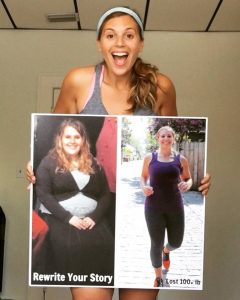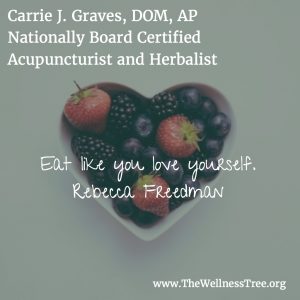Redefining My Relationship with Food
For as long as I can remember, I have had an unhealthy relationship with food. I developed habits of using food as a source of comfort and a way to cope with my emotions at a young age and allowed these behaviors to escalate over the years. The purpose of food in my life was not to nourish my body when I was feeling hungry, but rather to fill a void when I was feeling bored, sad, lonely, excited, happy, anxious, etc. When food is consumed for reasons other than hunger, it is very difficult to decide when to stop eating, and you quickly begin to feel like you have lost control. Overeating caused me physical and emotional discomfort, which resulted in a cyclic behavior of turning to food once again to numb those feelings.
By the age of 20, I found myself medically fitting under the category of “obese,” weighing in at almost 300 pounds. I would try so hard to follow strict diets, but eventually I would end up feeling deprived, and I would run back to all of the foods that I wasn’t allowed to have on my diet. The shame spiral I would go down in my head after overeating always had the same exact result: more overeating.
After 6 or 7 years of feeling lost in an extreme diet-binge-diet cycle, I managed to lose some of the weight, but I didn’t feel like I had found a sustainable solution. Food still had so much power over me and I sensed that there was something deeper than dieting that I needed to address if I was going to break this cycle.
This past year, I made a commitment to myself to get to the bottom of this. My intention was to permanently change my relationship with food and develop healthy eating behaviors. What I didn’t know at the time was that in order to change my relationship with food, I first needed to change my relationship with myself.
It turns out that true freedom comes from within, not from following the rules of a diet. When I began looking within, it became clear to me that I had allowed my excess body weight to completely define who I thought I was as a person in this world. I didn’t believe that I was worth loving and I didn’t even want to treat my body with respect. I decided to start looking closely at the stories I had created in my head throughout the years about who I thought I was and what I thought I deserved and began finding the strength to rewrite these stories. I faced my fears, took risks, and did all of the things that I always told myself that I couldn’t do. Eventually, I had enough evidence to fully support that my old stories were simply not factual and I slowly began believing in myself.
Through the development of self-love, I was able to learn how to respect and trust my body enough to actually listen to it. It turns out that I don’t need to count calories or track points to look and feel healthy because our bodies actually have a built-in signaling system that tells us when we’re hungry, full, what to eat, and when to eat it. All of the answers are inside of us; we just have to learn to listen.
Not only have I lost over 120 pounds and gone down 9 sizes in clothing, but I can confidently say that I have formed a sustainable positive relationship with food (and more importantly, with myself).
Here’s what this positive relationship looks like:
- I know why I’m eating when I eat. 98% of the time, I wait until my body gives me hunger signals before I choose to eat. If I have the urge to eat when I’m not hungry, I take it as an opportunity to figure out what is really going on and give myself what I need. For example, if I am craving ice cream, the first thing I do is check-in with my body to see if I’m hungry. If I’m not hungry, I ask myself how I’m feeling emotionally. Sometimes, I’m really just feeling exhausted when I want a treat. Now I address the problem directly, by allowing myself to rest when I’m feeling tired, rather than stuffing my feelings with food.
- When I am hungry, I take the time to really ask my body what it wants to eat. I say things to myself like, “Hey body, how are you feeling? What kind of food will make us feel alive and unstoppable today?” When considering my options, I visualize what my body will feel like after I eat the proposed meal. As long as my body gives me the green light, I’ll eat it. This means that some days toast feels like a good idea and other days, I prefer to be grain-free. I am not on a restrictive diet; I simply listen to my body and give it what it truly wants. My body always tells me what is best. When I consider having something like French toast or doughnuts for breakfast, my body reminds me of how it typically feels after eating things like that, and then the appeal is gone and I choose something my body will thrive off of instead. I love my body and I want it to feel good!
- I stick to real food. This is a full-time job of constantly reading labels and asking questions to ensure that what I’m eating is actual food. I was about to put some butter on my toast this morning at a restaurant, until I looked at the package and noticed that it was not butter. The product’s technical name was “whipped spread.” Hmm… The ingredients consisted of things like liquid and partially hydrogenated soybean oil, artificial flavor, and vegetable mono & diglycerides. Thanks, but no thanks. Now that I value my life, I like to know (and be able to pronounce) the things that I’m putting into my body. I want my body to be around for a long time, so I fill it with nutrient-dense foods that are found in nature, not in a chemistry lab.
- When I’m full, I stop eating. This has been the hardest behavior to master. Sometimes I have to remind myself that food isn’t the only form of excitement in my life anymore. Now that I have interests, hobbies, a social life, and things I’m passionate about, I’m too busy to obsess about food. Stopping when I’m full, even if what I’m eating is delicious, is a way of reinforcing the message that I love myself and food no longer controls my life.
- When I eat too much or something unhealthy, I give myself a hug, and I move on. Immediately after a situation like this, thoughts of failure and fear flood my mind. I worry that I’m going to lose control and get right back into a vicious cycle. But now that I’m on my team and like myself, a stronger me jumps in and shuts those thoughts down. Sometimes I have to bring down the hammer 50 times, but I don’t give up. In reality, usually all that has actually happened is that I have given myself a stomachache and I feel bloated. I now understand that these uncomfortable feelings will go away and that I do not need to define my self-worth based on the food choices I make. When I find myself in this place, I drink tons of water, go for long walks, and I give myself extra love and compassion. I already know where judging myself will get me, and I’m not about that life anymore!
M y relationship with food was developed through years of trial and error and truly getting to know my body. Every body is different. We each have the ability to take the time to get to know our bodies and gather our own data about what feels good and what doesn’t. The human body is not static. The foods that feel good to us today may not feel good tomorrow, and that’s okay. Eating thoughtfully and listening to our bodies requires patience and effort, but I can’t think of anything more important to invest in than my health!
y relationship with food was developed through years of trial and error and truly getting to know my body. Every body is different. We each have the ability to take the time to get to know our bodies and gather our own data about what feels good and what doesn’t. The human body is not static. The foods that feel good to us today may not feel good tomorrow, and that’s okay. Eating thoughtfully and listening to our bodies requires patience and effort, but I can’t think of anything more important to invest in than my health!

